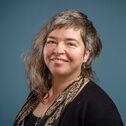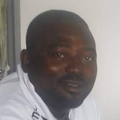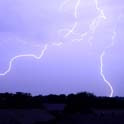
Damon Matthews (Professor and Concordia University Research Chair in Climate Science and Sustainability)
My research revolves around the use of Earth system climate models as a tool to investigate human influences on the climate system, and to estimate the cumulative emissions associated with different climate mitigation targets. I am also interested in better quantifying how climate impacts scale with total greenhouse gas emissions, and developing new ways to measure historical national contributions to and responsibility for climate warming. See also my Concordia Faculty page or download my CV.
My research revolves around the use of Earth system climate models as a tool to investigate human influences on the climate system, and to estimate the cumulative emissions associated with different climate mitigation targets. I am also interested in better quantifying how climate impacts scale with total greenhouse gas emissions, and developing new ways to measure historical national contributions to and responsibility for climate warming. See also my Concordia Faculty page or download my CV.

Donny Seto (Lecturer and CSIM Lab Manager)
Research interests and expertise include analyzing the carbon footprint of cities, sustainable urban development, impact assessment, and conducting GIS-based analyses of the interaction between climate changes and fossil fuel reserves. As a lecturer in the Department of Geography, Planning and Environment, I have taught course related to Urban Representation, Impact Assessment, Data Collection, Management and Analysis, Cartography, and GIS.
Research interests and expertise include analyzing the carbon footprint of cities, sustainable urban development, impact assessment, and conducting GIS-based analyses of the interaction between climate changes and fossil fuel reserves. As a lecturer in the Department of Geography, Planning and Environment, I have taught course related to Urban Representation, Impact Assessment, Data Collection, Management and Analysis, Cartography, and GIS.

Jen Gobby (Post Doc)
is an activist-scholar based in rural Quebec. She is founder of the MudGirls Natural Building Collective, and organizes with Climate Justice Montreal. She completed her Ph.D at McGill in 2019 as part of the Economics for the Anthropocene partnership and is now a post doctoral fellow at Concordia University in the Department of Geography, Planning and Environment. She has spent the last 5 years thinking collaboratively with land defenders and environmental justice activists about how we can more powerfully push for large scale social change. Her current research focuses on documenting and leveraging the learnings going on in movements and communities about how we can seize the Covid-19 crisis to push for transformative change in social, economic and political systems. She is also working on a project with Indigenous Climate Action to develop Indigenous-led climate policy. She is on the steering committee of Concordia’s SHIFT Centre for Social Transformation.
is an activist-scholar based in rural Quebec. She is founder of the MudGirls Natural Building Collective, and organizes with Climate Justice Montreal. She completed her Ph.D at McGill in 2019 as part of the Economics for the Anthropocene partnership and is now a post doctoral fellow at Concordia University in the Department of Geography, Planning and Environment. She has spent the last 5 years thinking collaboratively with land defenders and environmental justice activists about how we can more powerfully push for large scale social change. Her current research focuses on documenting and leveraging the learnings going on in movements and communities about how we can seize the Covid-19 crisis to push for transformative change in social, economic and political systems. She is also working on a project with Indigenous Climate Action to develop Indigenous-led climate policy. She is on the steering committee of Concordia’s SHIFT Centre for Social Transformation.

Seth Wynes (Post Doc)
I am a postdoctoral fellow studying climate change mitigation. Much of my previous work centers around the most effective actions that individuals can take to fight climate change. At the moment I have ongoing projects on the politics of climate change mitigation and reducing the climate impact of air travel. I try to focus on conducting research that is policy-relevant or of interest to members of the general public and enjoy communicating my research online, in media and especially in person. I am also a Research Officer with Sustainability in the Digital Age.
I am a postdoctoral fellow studying climate change mitigation. Much of my previous work centers around the most effective actions that individuals can take to fight climate change. At the moment I have ongoing projects on the politics of climate change mitigation and reducing the climate impact of air travel. I try to focus on conducting research that is policy-relevant or of interest to members of the general public and enjoy communicating my research online, in media and especially in person. I am also a Research Officer with Sustainability in the Digital Age.

Claude-Michel Nzotungicimpaye (Post Doc)
My current research explores the link between anthropogenic CO2 emissions and observable impacts of global warming. The research project builds on (1) the quantitative relationship between cumulative CO2 emissions and global temperature commonly known as transient climate response to cumulative emissions (TCRE), and (2) regional estimates of the TCRE.

Anders Bjørn(Post Doc)
Anders’ current research revolves around the recent trend of companies setting emission reduction targets informed by the temperature goal of the Paris Agreement. The overall project goal is to understand the potential impact of such "science-based targets" on global emissions. To do this, he is 1) reviewing and comparing the methods that are available to set science-based targets, 2) studying the methodological choices of companies and the quantitative effect on targets, 3) analysing companies’ reported progress against their targets, and 4) reviewing the broader literature on science-based targets to understand their indirect effect on other actors, such as investors and regulators. Anders is also interested in corporate net-zero emission targets and the role of negative emission technologies envisioned by companies.
Anders’ current research revolves around the recent trend of companies setting emission reduction targets informed by the temperature goal of the Paris Agreement. The overall project goal is to understand the potential impact of such "science-based targets" on global emissions. To do this, he is 1) reviewing and comparing the methods that are available to set science-based targets, 2) studying the methodological choices of companies and the quantitative effect on targets, 3) analysing companies’ reported progress against their targets, and 4) reviewing the broader literature on science-based targets to understand their indirect effect on other actors, such as investors and regulators. Anders is also interested in corporate net-zero emission targets and the role of negative emission technologies envisioned by companies.

Yisa Ginath(Ph.D. Student )
My current research is focused on monitoring forest cover and land use change in the Congo Basin under socioeconomic impacts and climate change. Applications to forest fragmentation and connectivity, and potential impacts on Great Apes spatial and behavioral diversity.
My current research is focused on monitoring forest cover and land use change in the Congo Basin under socioeconomic impacts and climate change. Applications to forest fragmentation and connectivity, and potential impacts on Great Apes spatial and behavioral diversity.

Maida Hadziosmanovic (Ph.D Student)
Maida’s research interests are founded in addressing corporate responsibility for climate change. To encourage companies to act on climate change, she focuses on establishing this concept of climate responsibility explicitly and on developing a framework that defines a ‘climate responsible company’. She also aims to develop a more complete idea of global corporate GHG emissions, to better understand the various aspects of a business that could predict company-level emissions, and to align corporate objectives with global climate objectives. As previous findings have shown that most public companies worldwide do not disclose their GHG emissions, Maida’s objective is to fill this gap and develop an alternative method for emissions accounting which is independent of company-level emissions accounting efforts and dependent on aspects of a business.
Maida is also interested in issues related to reporting and regulation of corporate GHG emissions, as well as GHG accounting transparency.
Maida’s research interests are founded in addressing corporate responsibility for climate change. To encourage companies to act on climate change, she focuses on establishing this concept of climate responsibility explicitly and on developing a framework that defines a ‘climate responsible company’. She also aims to develop a more complete idea of global corporate GHG emissions, to better understand the various aspects of a business that could predict company-level emissions, and to align corporate objectives with global climate objectives. As previous findings have shown that most public companies worldwide do not disclose their GHG emissions, Maida’s objective is to fill this gap and develop an alternative method for emissions accounting which is independent of company-level emissions accounting efforts and dependent on aspects of a business.
Maida is also interested in issues related to reporting and regulation of corporate GHG emissions, as well as GHG accounting transparency.

Daniel Horen Greenford (Ph.D. Student)
I am interested in policy solutions to facilitate emissions reductions necessary to avert dangerous climate change. My thesis study will use an intermediate complexity climate model to derive an empirical estimate of the relative effect of different greenhouse gases (GHG) and aerosols emissions on climate, which I will then apply to the calculation of national contributions to climate change. Other interests include the climate impact of energy technologies such as electrical utility infrastructure and the role of innovation on the rate of market proliferation of renewable energy technologies and competition affects between renewables and conventional utilities.
I am interested in policy solutions to facilitate emissions reductions necessary to avert dangerous climate change. My thesis study will use an intermediate complexity climate model to derive an empirical estimate of the relative effect of different greenhouse gases (GHG) and aerosols emissions on climate, which I will then apply to the calculation of national contributions to climate change. Other interests include the climate impact of energy technologies such as electrical utility infrastructure and the role of innovation on the rate of market proliferation of renewable energy technologies and competition affects between renewables and conventional utilities.

Travis Moore (Ph.D. Student)
I am very passionate about the atmosphere and meteorological phenomena, particularly with respect to severe to extreme weather events. My research interests broadly lie in examining the extent to which a warmer global (and regional) climate may affect the frequency and intensity of various weather extremes, as well as apply statistical methods that could potentially better quantify trends. For my PhD research, I am interested in statistically analyzing annual global and regional extreme precipitation data from a suite of models participating in the Climate Model Intercomparison Project Phase 5 (CMIP5). This project aims to quantify observed and estimated future trends of extreme precipitation, and other weather extremes, as a function of cumulative carbon emissions. I am also involved in severe weather videography and photography (notably for thunderstorms), and I am active in weather forecasting independently, including preparing seasonal outlooks for Southern Ontario to Southern Quebec. Please feel free to visit my LinkedIn and Facebook pages.
I am very passionate about the atmosphere and meteorological phenomena, particularly with respect to severe to extreme weather events. My research interests broadly lie in examining the extent to which a warmer global (and regional) climate may affect the frequency and intensity of various weather extremes, as well as apply statistical methods that could potentially better quantify trends. For my PhD research, I am interested in statistically analyzing annual global and regional extreme precipitation data from a suite of models participating in the Climate Model Intercomparison Project Phase 5 (CMIP5). This project aims to quantify observed and estimated future trends of extreme precipitation, and other weather extremes, as a function of cumulative carbon emissions. I am also involved in severe weather videography and photography (notably for thunderstorms), and I am active in weather forecasting independently, including preparing seasonal outlooks for Southern Ontario to Southern Quebec. Please feel free to visit my LinkedIn and Facebook pages.

Etienne Guertin (Ph.D Student)
I am interested in improving the understanding of the interrelationship between wildfires and climate change at a global scale. I use the University of Victoria Earth System Climate Model (UVic ESCM) to model wildfires in the different climate and vegetation regions simulated by the model. In the end, I am interested at knowing whether or not global fire regime will change in the next hundreds of years due to climate change and if that in return will affect climate. I hope that my research will increase the scientific understanding of the mechanisms that lead to wildfires and help policy makers and forest managers adapt in advance to the changing global fire regime.
I am interested in improving the understanding of the interrelationship between wildfires and climate change at a global scale. I use the University of Victoria Earth System Climate Model (UVic ESCM) to model wildfires in the different climate and vegetation regions simulated by the model. In the end, I am interested at knowing whether or not global fire regime will change in the next hundreds of years due to climate change and if that in return will affect climate. I hope that my research will increase the scientific understanding of the mechanisms that lead to wildfires and help policy makers and forest managers adapt in advance to the changing global fire regime.

Mitchell Dickau (M.Sc. Student)
I am studying the impacts of climate change on outdoor ice rinks in Montreal. A better understanding of how the outdoor skating season has responded to warmer winter temperatures and increased climate variability will allow for more accurate predictions on the long-term viability of outdoor skating. I believe this research has the potential to be used as an effective tool for climate change awareness and education here in Canada. My other areas of interest include governmental climate change policy, the perception of climate change in the public sphere, and the uneven distribution of the costs of climate change and environmental degradation.
I am studying the impacts of climate change on outdoor ice rinks in Montreal. A better understanding of how the outdoor skating season has responded to warmer winter temperatures and increased climate variability will allow for more accurate predictions on the long-term viability of outdoor skating. I believe this research has the potential to be used as an effective tool for climate change awareness and education here in Canada. My other areas of interest include governmental climate change policy, the perception of climate change in the public sphere, and the uneven distribution of the costs of climate change and environmental degradation.

Miles Barette Duckworth (M.Sc. Student)
My research investigates the potential for carbon sequestration through chemical weathering of gravel on gravel roads. With our changing climate, negative emissions strategies need to be explored, as reduction in atmospheric carbon dioxide
levels is necessary to avoid the major impacts of climate change. As gravel roads represent an unintentional form of enhanced weathering, my research seeks to investigate whether gravel roads contribute meaningfully to the reduction of atmospheric carbon dioxide levels over short timescales. My other areas of interest are; food politics, freshwater fish biology, river geomorphology, and web-based programming. For more about me, please visit my linkedin profile.
My research investigates the potential for carbon sequestration through chemical weathering of gravel on gravel roads. With our changing climate, negative emissions strategies need to be explored, as reduction in atmospheric carbon dioxide
levels is necessary to avoid the major impacts of climate change. As gravel roads represent an unintentional form of enhanced weathering, my research seeks to investigate whether gravel roads contribute meaningfully to the reduction of atmospheric carbon dioxide levels over short timescales. My other areas of interest are; food politics, freshwater fish biology, river geomorphology, and web-based programming. For more about me, please visit my linkedin profile.
CSIM Alumni and graduates
- Nadine Mengis (Post-Doctoral Researcher): Calculating carbon budgets for ambitious climate mitigation targets and quantifying the uncertainty arising from model parameters
- Yann Chavaillaz (Post-Doctoral Researcher): Risk of abrupt climate changes resulting from cumulative emissions and their effect on the intensity, the duration and the frequency of extreme events
- Antti-Ilari Partanen (Post-Doctoral Researcher): Aerosols emissions as pollutant and as factor in climate forcing; the impact of GHG type on the relationship between cumulative carbon emissions and climate change; estimating carbon budgets for ambitious climate targets
- Jean-Sébastien Landry (Post-Doctoral Researcher): Modelling fire and other disturbances in the climate system
- Martin Leduc (Post-Doctoral Researcher): Regional estimates of the transient climate response to cumulative CO2 emissions
- Christopher Simmons (Post Doctoral Researcher & Ph.D.): Carbon cycle dynamics since the last glacial maximum
- Marc-Olivier Brault (Ph.D.): Modelling the effect of continental weathering on ocean carbon cycling over the last glacial cycle
- Samantha Mailhot (M.Sc. Student). Ecological economics and environmental psychology in public opinion and value placed on economic growth against environment.
- Alex MacIsaac (M.Sc.): Quantify the contribution to warming from non-carbon dioxide emission rates using simplifed metrics
- Tanya Graham (M.Sc.): GIS analysis to assess the impact of CO2 emissions and the resulting climate changes across terrestrial mammal habitat ranges
- Trevor Smith (M.Sc.): Climate change impacts on wine growing in Quebec
- Loukia Papadopoulos (M.Sc.): Criteria for successful implementation of Nationally Appropriate Mitigation Actions
- Daniel Horen Greenford (M.Sc.): Equitable allocation of emissions embodied in international trade
- Sophie Gauvreau (M.Sc. Student). Phenology changes due to climate warming, with a focus on the timing of spring pollination in Silver Maple.
- Cassandra Lamontagne (M.Sc.): Local observations of environmental change and climate change impacts in Gitga'at First Nation
- Travis Moore (M.Sc.): Extreme weather events due to global mean temperature increases
- Marc-Olivier Brault (M.Sc.): Effect of Pleistocene megafauna on early Holocene climate
- Nikolay Damyanov (M.Sc.): Effect of winter warming on outdoor skating in Canada
- Andrew Pinsonneault (M.Sc.) Effect of ocean acidification on the marine carbonate cycle
- Karen Paquin (M.Sc): Potential for carbon sequestration in boreal forest woodlots
- Andrew Ross (M.Sc.): Probabilistic assessment of the rate of future climate change
- Alex Matveev (M.Sc.): Evaluating the land use change carbon flux and its impact on climate
- Mitchell Dickau (Honours): Impacts of climate changes on outdoor skating conditions in Montreal
- Brogan Stewart (Honours): Potential loss of primate habitat on a global-scale from future climate change
- Samantha Mailhot (Honours): Climate clock as a tool for effective climate science communication
- Tanya Graham (Honours): Impact of climate change on primate populations
- Trevor Smith (Honours): Metrics for comparing the climate effect of different greenhouse gases
- Serge Keverian (Honours): Regional attribution of carbon emissions and climate change
- Kelly Nugent (Honours): Drivers of North American continental runoff and implications for ocean circulation
- Andrew Pinsonneault (Honours): Climate model reliability in simulating enhanced forest productivity resulting from CO2 fertilization
- Andrew Ross (Honours): Impact of geoengineering on the rate of climate warming.
